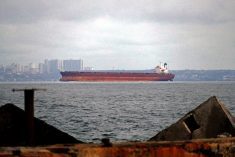Other than those who handle grains and oilseeds at port terminals and elevators, longshore workers at Canada’s West Coast ports are poised to walk off the job starting Saturday morning.
The International Longshore and Warehouse Union (ILWU Canada) on Wednesday morning served the British Columbia Maritime Employers Association (BCMEA) with 72 hours’ strike notice, which would see strike action begin Saturday at 8 a.m. PT.
The BCMEA — which represents 49 employers at B.C.’s waterfront, such as ship owners and agents, stevedores and container and cruise ship terminal operators — emphasized in its statement Wednesday that any work stoppage “will not impact employees required to service grain vessels” as per the Canada Labour Code.
Read Also

Alberta harvest wrapping up: report
Harvest operations advanced to 96 per cent complete in Alberta as of Oct. 7, with only a few late-seeded cereal and canola fields remaining, according to the latest provincial crop report.
Under section 87.7 (1) of the Code, longshore workers “shall continue to provide the services they normally provide to ensure the tie-up, let-go and loading of grain vessels at licensed terminal and transfer elevators, and the movement of the grain vessels in and out of a port.”
Exports of grains, oilseeds and related byproducts through licensed elevators at Vancouver and Prince Rupert totalled 31.51 million tonnes in 2020-21, and were cut by drought to 17.55 million tonnes in 2021-22.
The ILWU, in a separate statement Wednesday, said its bargaining committee “has run out options at the bargaining table because the BCMEA and their member employers have refused to negotiate on the main issues.”
Those issues, the union said, include protection for its members against job losses caused by contracting-out and port automation, and against “record-high inflation and skyrocketing cost of living.”
Port employers, the union said, “have repaid our hard work and dedication with demands for major concessions. Their only objective is to take away rights and conditions from longshore workers after having gorged themselves on record profits during the pandemic.”
The ILWU and BCMEA have been in talks with the Federal Mediation and Conciliation Service (FMCS) since March 28, when the union filed a notice of dispute, the BCMEA said.
The employer association said it has since put forward “multiple proposals and positions in good faith, with the objective of making progress and achieving a fair deal at the table.” Talks are still scheduled to continue between the parties with FMCS on Thursday, BCMEA added.
The BCMEA said it’s also “open to any solution that brings both parties to a balanced agreement.” For one, it proposed binding mediation and arbitration, but added that the ILWU has so far “declined” that proposal.
Federal Labour Minister Seamus O’Regan and Transport Minister Omar Alghabra said in a separate statement Wednesday that the FMCS will “keep supporting negotiations until an agreement is reached.”
All parties, the ministers said, understand “what is at stake for Canadians and our supply chains,” adding that port facilities and workers “are responsible for moving goods both nationally and internationally, and industries and consumers would feel the effects of a work stoppage.”
The ministers, in their statement, did not mention back-to-work legislation as an option to prevent a strike, saying instead that they “support the collective bargaining process because the best deals are made at the bargaining table.” The House of Commons adjourned for the summer on Wednesday last week.
The ministers said they “strongly encourage the parties to get back to the bargaining table and work together to reach an agreement.”
The ILWU’s previous contract dispute with port employers ended in a deal on May 30, 2019 following a BCMEA lockout that lasted just a few hours. –– Glacier FarmMedia Network

















